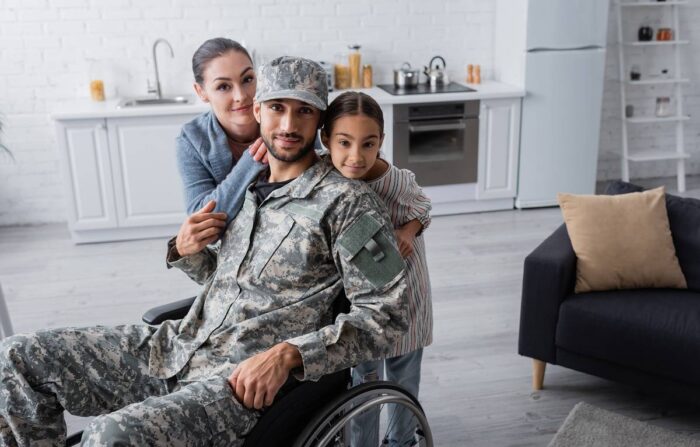Purchasing your first home is one of the most important decisions in your life. The one question on the minds of most first-time homebuyer veterans is what they can afford when buying a house.
Various factors need to be considered when calculating what a reasonable mortgage would be, including your annual income, your current debt, the amount of your down payment, the fees associated with purchasing a home, and the amount of homeowners insurance you'll need at the time.
In this article, we will shed light on what a VA loan entails, the benefits of getting a VA loan, the different types of VA loans, and guide you through the steps of obtaining a VA loan. In short, this is a guide to everything VA home buyers should know about VA loans.
For single moms looking to buy their first home, check out this guide on first-time home buyer grants for single moms.
What Is A VA Loan?
It is possible for veterans to qualify for VA loans even if conventional loans are not available. Veteran home buyers can secure lower rates, qualify for more expensive properties and purchase a home without a down payment with VA loans, which are issued by private lenders and backed by the US Department of Veterans Affairs (VA).
For VA loans, the Veterans Affairs Department ensures the underlying mortgage. By doing so, the VA makes sure that lenders are protected in case the borrowers fall behind or default on their loans.
In the event of a borrower defaulting or falling behind on their scheduled payments, the VA intervenes and compensates the lenders partially for their losses. Due to the fact that the VA backs these mortgages, the lenders are willing to offer these loans at more favorable terms.
This means veterans can apply for VA loans despite low credit scores and take advantage of low or no down payment requirements and reduced interest rates. Veteran's Administration grants are also available to help veterans with disabilities make modifications to their homes, such as wheelchair ramps, that will improve their quality of life.
The eligibility criteria for a VA loan include military service of at least 90 days of active duty during a war or 181 days of service during peace.
Benefits Of VA Loans
Military veterans, active duty service members, and surviving spouses have many mortgage options available through VA loans. Veterans' loans are characterized by a handful of distinct financial benefits not seen in other types of mortgages.
VA loans provide many advantages over conventional mortgages. VA loans have become very significant over the last few decades, especially due to the advantages they provide over traditional loans.
The VA loan program has assisted countless veterans, service members, and their family members in becoming homeowners. For this reason, VA loans have been among the best mortgage options in the market since the Great Recession.
1. No Down Payment Requirement
There is no down payment requirement for qualified veterans with a VA loan, which is by far its greatest benefit. Due to this characteristic of VA loans, veterans need not save money for a down payment for years to finance the purchase of a home.
Typically, conventional loans require a down payment of 5%, whereas FHA loans require a 3.5% down payment. For the average military borrower, these are significant sums of money.
2. No PMI Required
Private mortgage insurance or PMI is an insurance policy that provides protection to lenders in the event that a borrower defaults on their mortgage payments. Unless you can pay a down payment of at least 20%, conventional lenders will require you to pay a monthly mortgage insurance premium.
The fee will continue until the equity in the home reaches 20 percent. Mortgage insurance is not required for VA loans, unlike conventional and FHA loans.
3. Competitive Interest Rates
Veterans can also save money with the VA loan program since it offers the lowest interest rates. Usually, VA loans carry interest rates that are 0.5 to 1 percent lower than those for a conventional loan. Veterans save money every month and over the lifetime of their loans when interest rates are lower.
4. Relaxed Credit Requirements
The VA does not enforce or set credit score minimums because it is only responsible for overseeing the loan program. Credit score benchmarks are used by most VA lenders to assess a borrower's default risk.
Minimum credit scores for conventional mortgages can vary, but they are typically lower than those needed for borrowers with low credit scores.
For veterans to qualify for competitive interest rates on mortgages, they don't need perfect credit. Moreover, VA loans are more accommodating if you have already gone through bankruptcy, foreclosure, or short sale.
5. No Prepayment Penalties
Some types of loans have a prepayment penalty when paid off before maturity. Lenders impose these penalties due to the loss of additional (remaining) interest payments. Some of that lost money is recouped by the prepayment penalty. A VA loan does not impose any prepayment penalties on borrowers who pay off their loans early.
Types Of VA Loans
There are many types of VA loans that veterans can take out. Veterans can make energy-efficient upgrades to their homes, tap into their home equity, refinance to lower interest rates, or purchase a new home with their VA loan benefit. The following are the most applied VA loans.
VA Purchase Loans
Veteran-owned homes are often purchased with VA purchase loans. A primary residence can be purchased with this type of loan by veterans.
VA IRRR Loans
Veterans who want to lock in a lower interest rate or refinance out of adjustable-rate VA loans can take advantage of the VA Interest Rate Reduction Refinance Loan (IRRRL), sometimes called a VA Streamline Refinance. Active VA loan holders are the only ones who can use this option.
VA Cashout Refinance
VA Cash-Out refinances available to veterans who wish to receive cash in exchange for equity in their homes. The VA loan holders can use the funds to repay debts, improve their homes, or cover emergencies. Mortgages that are not VA-backed can be refinanced by veterans using this option.
VA Energy Efficient Mortgage (EEM)
Veteran home buyers may be able to reduce their utility costs by using VA EEMs. When you purchase your home, you must invest in energy-efficient upgrades to reduce heating and cooling costs. Energy-efficiency improvements may be financed with this home loan for qualified veteran homeowners.
Low-income families can get free mattresses and beds if they can't afford to buy them.
Steps For Getting A VA Loan
Mortgage applications can be daunting for many borrowers. However, if we break down the VA loan application process into steps, the process of obtaining a VA loan seems straightforward.
Step1: Finding A VA-Approved Lender
VA loans are not offered by all lenders. Lenders approved by the US Department of Veterans Affairs are the only ones authorized to originate VA mortgages. In addition, some lenders specialize almost exclusively in VA loans for military clients, while others specialize almost exclusively in conventional loans.
The loan process will be easier and quicker if you use a VA specialty lender that specializes in VA loans rather than a lender that specializes in VA mortgages only a few times each year.
Step 2: Obtain a Certificate of Eligibility (COE)
Getting a Certificate of Eligibility is possible with the help of an experienced lender. Obtaining a Certificate of Eligibility allows you to prove you met the initial eligibility requirements for VA loans. A COE helps the lenders get an idea of your VA loan entitlement or how much of your loan VA will guarantee.
The VA eBenefits portal, or the respective portals of lenders, allows you to easily obtain a COE online. The COE can be obtained by mail for those who cannot get theirs online.
Step 3: Prequalify for Your Loan Amount
There is no requirement for prequalification. If you prequalify, you can save time and avoid unexpected surprises down the road. During your VA loan prequalification process, your VA loan professional will discuss your financial situation and other factors that may influence your eligibility to receive a VA loan.
You may also need to improve your credit or debt-to-income ratio before being approved. Although prequalification provides you with a ballpark figure for the price range of your potential house, it does not guarantee your approval, and lenders will verify all the information provided to them irrespective of whether you prequalify or not.
Step 4: Find A House
In general, borrowers enjoy the fourth step the most. Getting the most out of your VA benefits is possible with the help of a real estate professional who specializes in VA transactions.
A knowledgeable agent will be able to negotiate seller-paid fees with you (if both you and the seller agree). A VA loan can be applied for as soon as you have a signed purchase agreement.
Step 5: Application Processing And VA Appraisal
You will need to sign a purchase contract to complete your initial application. A VA appraisal can be ordered by your lender with this information. Choosing an appraiser is not a simple matter.
The home being considered for VA financing can only be evaluated by a professional who is certified to perform VA appraisals. It is the VA appraiser's responsibility to ensure the agreed-upon price corresponds to the fair market value of the house.
As a part of VA appraisal, a home inspection is conducted to ensure that the home conforms to the minimum property requirements (MPRs) set by the VA and looks for compliance with the relevant building codes and safety standards. Appraisers are given ten days by the VA to complete the appraisal. The lender will then verify the appraisal, and the underwriter will approve the loan.
Step 6: Closing The Loan
Once the underwriter approves the loan, you can close the loan and move into your new house. A legal transfer of ownership occurs during the closing process. During closing, you will sign documents acknowledging your understanding and agreement with the loan terms.
A homeowners insurance certificate must be provided, along with closing costs if necessary. The keys to your new home will be handed over to you after you've signed all your closing documents.
Taking out a VA loan can seem to be a daunting challenge for veterans looking to buy their own homes. VA loans offer many benefits to veterans over their conventional counterparts.
There are a variety of VA loans available to veterans that can be used to purchase a new home, repair an existing loan, refinance existing loans, reduce their current interest rates, or make their homes more energy efficient. Taking out a VA loan is a step-by-step process that veterans need to follow in order to successfully obtain a VA loan.
You can read more articles on government and private assistance programs at Gov-Relations. If you are a single father struggling financially, read our blog post on financial support options available for single fathers.




